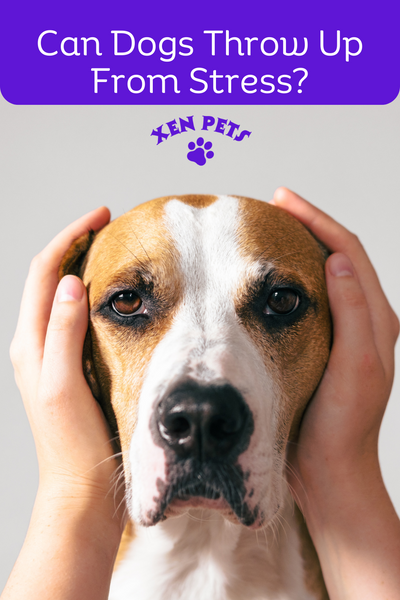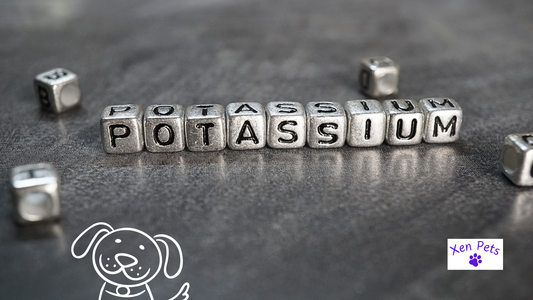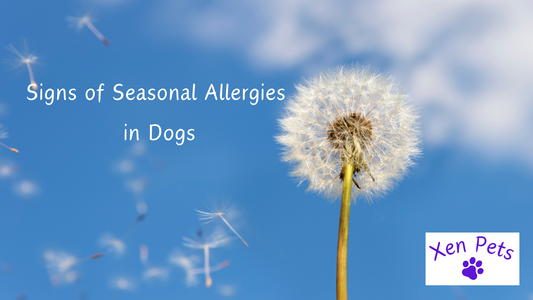Can Dogs Throw Up From Stress?
Tory JohnsonShare
Do dogs throw up when stressed? Yes, unfortunately many dogs can vomit from stress.
Dogs get stressed just as humans do, and it can show itself in many ways.
So, if your dog is vomiting and you're not sure why, it's worth considering whether they might be feeling anxious, stressed, or worried about something.

What is stress?
The sympathetic nervous system is best known as the key player in dangerous or stressful situations.
It speeds up your heart rate and delivers more blood to areas that need it, like when you're running away from something scary!
In some cases, there may be an easy solution to make your pup feel better, but other times you'll just have to wait for it to pass.

Anti anxiety medications may be helpful in these situations. But some of these medications can be harsh on their stomach.
Our calming chews help relax your dog during anxious situations.
Shop Today: Calming Chews for Dogs.
Either way, being aware of stress levels and your dog's health is a key part of being a good pet parent!
To help your dog during stressful times, it's important that you know what the signs of a stressed out dog are.
Let's look at some of the signs and how stress affects our furry friends.
3 Signs of Stress
Dog's experience stress in many different ways. Your dog's experience may be a lot different than other dogs. Here are three major signs of stressed dogs.
1. Upset Stomach and/or Vomiting
As we discussed, dogs do vomit when they're stressed out. As pet parents, we can usually tell when our dog's stomach is not feeling 100%. Usually this due to their diet. But sometimes it isn't.
Stressful situations can cause an upset stomach, ultimately leading to vomiting.
2. Shaking
As pet parents, we should be aware of our dog's behavior and if it seems to be changing. One obvious sign is shaking.
We've all likely seen our dog begin to shake in extremely stressful situations (e.g. the groomers, at the vet, around new people or dogs). This is a clear cut sign your dog is experiencing stress.
3. Loss of Appetite
A change in your dog's diet and a loss of appetite is another sign of increased stress levels.
If you notice this, try to be aware of other changes in behavior. If it continues, think about seeing a veterinary behaviorist to discuss the issues.
3 Causes of Stress in Dogs
Here are three causes of stress in dogs, and what you can do to help.
1. Separation Anxiety
Many dog owners have experienced the heart-wrenching moment when their dog suddenly realizes they're about to be left alone.
Your dog may start to pace back and forth, whine or bark, or even try to escape.
This behavior is known as separation anxiety, and it's one of the most common problems faced by dog owners.

Fortunately, there are a few things you can do to help your dog overcome this anxiety.
First, try to create a calm environment before you leave. This means avoiding anything that will make your dog excited, such as playing fetch or going for a walk.
Once you're ready to go, say goodbye in a calm voice and give your dog a toy or calming chew to keep them occupied.
Finally, be sure to give your dog plenty of attention when you return home. With a little patience and understanding, you can help your furry friend overcome separation anxiety.
2. Confusion Associated With Old Age
One of the unfortunate side effects of aging is that our dogs can start to experience confusion and disorientation.
This can be especially confusing for them because they may not understand why their beloved humans suddenly seem unfamiliar.

While it can be tough to see our furry friends go through this, there are a few things we can do to help make the transition easier on them.
First, try to keep their routine as consistent as possible. If they normally go for a walk in the morning, stick to that schedule.
Also, make sure to provide plenty of mental stimulation in the form of interactive toys and games.
This will help keep their minds sharp and help reduce any feelings of anxiety or depression.
Finally, be patient and understanding – they may not be able to express what they’re feeling, but we can still show them that we love them no matter what.
3. Fear (loud noises, new environment, new baby in the house)
Dogs are afraid of many things from car rides to loud noises. The sound of fireworks or thunder can be particularly scary for them.
This is because dogs have much better hearing than humans. They can hear sounds that we can't even hear. This means that loud noises are even more overwhelming for them.
Dogs may also be afraid of loud noises because they don't understand them. They may not know what the noise is or where it's coming from. This can be very confusing and scary for them.
If your dog is afraid of loud noises, you can try to desensitize them to the noise by playing it at a low volume while they are relaxed. You can also try to create a safe space for them to go to when they are scared. This could be a room that is quiet and has no windows so they can't see the outside noise.
If your dog is still having trouble, you should talk to your veterinarian about other options, such as medication, that could help them feel more relaxed during events with loud noises.
Wrap Up: Do Dogs Throw Up When Stressed?
If your dog is vomiting, it's likely because they're experiencing stress. The most common causes of stress in dogs are separation anxiety, and fears coming from things like kennel stress.
By understanding what's causing your dog's stress, you can help them feel more comfortable and avoid potential vomiting episodes.
If you're not sure what's causing your dog's stress, talk to your veterinarian.
They'll be able to help you identify the root cause of the problem and provide guidance on how to best address it.
Shop Today: Calming Chews for Dogs.











